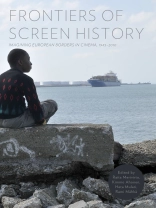Frontiers of Screen History provides an insightful exploration into the depiction and imagination of European borders in cinema after the Second World War. While films have explored national and political borders, they have also attempted to identify, challenge and imagine frontiers of another kind: social, ethnic, religious and gendered. The book investigates all these perspectives. Its unique focus on the representation of European borders and frontiers via film is groundbreaking, opening up a new field of research and scholarly discussion. The exceptional variety of national and cultural perspectives provides a rewarding investigation of borders and frontiers.
Table des matières
Foreword – Tom Conley Introduction: Encounters with Borders – Kimmo Ahonen, Raita Merivirta, Heta Mulari and Rami Mähkä Worlds Divided by the Iron Curtain Chapter 1: Imagining West Berlin: Spatiality and History in Wim Wenders’ Wings of Desire, 1987 – Hannu Salmi Chapter 2: ‘What’s Wrong with a Cowboy in Hamburg?’: New German Cinema and the German-American Cultural Frontier – Jacqui Miller Chapter 3: The Collapse of Ideologies in Peter Kahane’s The Architects – Marco Bohr Chapter 4: How to Win the Cold War: Borders of the Free World in Guilty of Treason (1950) and Red Planet Mars (1952) – Kimmo Ahonen Alternative Cultural Locations Chapter 5: Crossing Over: On Becoming European in Aki Kaurismäki’s Cinema – Sanna Peden Chapter 6: Looking for Alternative London: The London Nobody Knows and the Pop-Geographical Borders of the City – Kari Kallioniemi Chapter 7: The Cité’s Architectural, Linguistic and Cinematic Frontiers in L’Esquive – Jehanne-Marie Gavarini Borders Crossed, Borders Within Chapter 8: Between Hamburg and Istanbul: Mobility, Borders and Identity in the Films of Fatih Akin – Jessica Gallagher Chapter 9: Transnational Heroines: Swedish Youth Film and Immigrant Girlhood – Heta Mulari Chapter 10: Family as Internal Border in Dogtooth – Ipek A. Celik Post-Colonial Borders and Cultural Frontiers Chapter 11: Gendered Conflicts in Northern Ireland: Motherhood, the Male Body and Borders in Some Mother’s Son and Hunger – Raita Merivirta Chapter 12: Heartlands and Borderlands: El Dorado and the Post-Franco Spanish Cinema as a Bridgehead between Europe and Latin America – Petteri Halin Chapter 13: Subverted and Transgressed Borders: The Empire in British Comedy and Horror films – Rami Mähkä
A propos de l’auteur
Kari Kallioniemi is a researcher, adjunct professor and the leader of the ‘Thatcherism, Popular Culture and the 1980s’ project at the Cultural History department, University of Turku. His research interests focus on the relationships between different notions of nationality, neo-right and popular culture. His recent book on this subject is Englishness, Pop and Post-War Britain (Intellect, 2016). His current project deals with the themes of fascination with fascism in popular culture.












